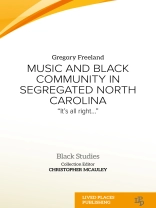Emotional courage is an underestimated characteristic of successful Black life in the segregated, unjust US south. Author Greg Freeland reflects on how music reflected, impacted, and influenced Black life in 1950s and 1960s North Carolina.
The celebratory aspect of the Black rhythm and blues, jazz, and gospel music of Freeland’s life is one of his clearest memories of the time. In this book, he recalls and reflects upon how music was integral to the solidary and resilience of his Black community in an unequal and unjust society. Through examples of music in the household, church, clubs, parties, and schools, this book explores how music worked in a manner that facilitated the development, mobilization, and realization of Black life.
สารบัญ
Learning objectives
Introduction
1: Music and community
2: Durham, North Carolina
3: Musics in Durham, from rhythm and blues to gospel
4: The church and gospel music
5: Intersection of music and everyday life in segregated society
6: Music in the Civil Rights Movement
7: Hayti, the Black Wall Street
8: Dining in Durham
9: Roots in slavery
10: Women in Hickstown; women in North Carolina; women in the struggle
11: A Change is Going to Come
12: Reflections on music and dance
13: Radio and WLAC
14: Music as a Transcendant Force
15: School days
16: Segregation in; segregation out
17: Sam Cooke takes it to another level
18: Improvisational survival
19: The music encompasses the struggle
20: Back to the Movement and out
Conclusion
Activities and learning objectives
เกี่ยวกับผู้แต่ง
Chris Mc Auley is a Professor of Black Studies at UC Santa Barbara where he teaches courses on the Caribbean, Black Political Thought, and US Foreign Policy. His main publications are on the work of Oliver C. Cox and W.E.B. Du Bois.












